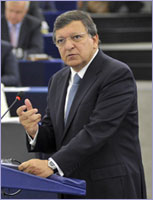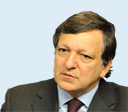|
|
|
|
|
|
 |
 |
 |
 |
Barroso on the State of the Union: EU efforts bear fruit but still work to be done
“For Europe, recovery is within sight,” European Commission President José Manuel Barroso said in his fourth State of the Union Address to the European Parliament on 11 September. Five years since the onset of the global financial crisis, “the facts tell us that our efforts have started to convince,” he said, noting that the most vulnerable countries are paying less to borrow, industrial output and consumer confidence are rising, and market confidence is returning. Much remains to be done, however, according to Barroso, including completing the banking union, finalising legislation on the Single Supervisory Mechanism and adopting the Single Resolution Mechanism. To spur growth and address unemployment, Barroso also called for an increase in the pace of structural reforms, implementation of the European budget and extension of the Single Market to cover new areas such as mobility, communications, energy, finance and e-commerce. Europe should also build on its rising trade surplus of more than EUR 300 billion, said Barroso. Citing the Commission Blueprint for a deep and genuine Economic and Monetary Union, he made the case for a genuinely united and more integrated Europe.
|
 |
 |
 |
|
 |
 |
 |
 |
 |
|
 |
 |
 |
| [At this point in time], with a fragile recovery, the biggest downside risk I see is political: lack of stability and lack of determination |
 |
José Manuel Barroso, President of the European Commission
|
|
|
|
 |
 |
 |
 |
Green light for Single Supervisory Mechanism for banks
The European Parliament gave the green light on 12 September to the EU bank supervision system that will bring some 150 of the EU’s largest banks under direct oversight by the European Central Bank (ECB) from September 2014. The Single Supervisory Mechanism (SSM) will be compulsory for all euro area Member States and will be open to all other EU countries. The supervisory powers of the ECB will take effect and become operational one year after the entry into force of the texts. New rules adapting the operating rules of the European Banking Authority (EBA) to the new framework will enter into force in parallel. Internal Market Commissioner Michel Barnier called establishment of the SSM “the first leg of the Banking Union” and “a lynchpin of a deeper economic and monetary union”. Attention is now expected to turn to legislation that would establish the Single Resolution Mechanism (SRM).
|
 |
|
 |
 |
|
 |
 |
 |
 |
Commission presents roadmap for tackling the risks inherent to shadow banking
The European Commission has proposed measures designed to reduce the risks to Europe’s financial stability posed by the shadow banking system. The Communication of 4 September summarises the work undertaken so far by the Commission and proposes new rules for money market funds (MMFs), among other possible further actions. Shadow banks are not regulated like banks yet engage in bank-like activities. According to the Financial Stability Board (FSB), they represented EUR 51 trillion or 25-30% of the total financial system in 2011, equivalent to half of bank assets. The new rules for MMFs would require them to improve liquidity, diversify risk and in some cases maintain a predefined capital buffer. MMFs are an important source of short-term financing for financial institutions, corporations and governments. In Europe, they hold 38% of short-term debt issued by the banking sector and around 22% of that issued by governments or by the corporate sector.
|
 |
|
 |
 |
|
 |
 |
 |
 |
Eurogroup approves release of EUR 1.5 billion in financial assistance for Cyprus
Euro area finance ministers have endorsed the disbursement of the next tranche of financial assistance to Cyprus amounting to EUR 1.5 billion. Meeting in Vilnius, Lithuania on 13 September, the finance ministers made their decision based on the conclusion of the first review mission by the Troika – the European Commission, the European Central Bank (ECB) and the International Monetary Fund (IMF) – that the adjustment programme for Cyprus is on track. They noted that the Cypriot authorities have “taken decisive steps to stabilise the financial sector, meet the fiscal targets and taken structural reforms forward.” The ministers also welcomed the fact that the Bank of Cyprus was taken out of resolution on 30 July, but they highlighted further steps that Cyprus must take – such as swiftly implementing the Anti-Money Laundering action plan and effective action toward correcting the excessive deficit by 2016 – before receiving more funds. The disbursement of EUR 1.5 billion will take place by the end of September, after formal approval by the European Stability Mechanism Governing bodies. In a separate decision, the IMF Board approved a disbursement of EUR 84.7 million for Cyprus on 16 September.
|
 |
|
 |
 |
|
 |
 |
 |
 |
G20 Leaders meet in St Petersburg to discuss global economy
The Presidents Barroso and Van Rompuy, as well as Vice-President Rehn, participated in the G20 Summit on 5-6 September in St Petersburg. G20 Leaders' discussions focused on growth, jobs and the global economy, as well as the situation in Syria. For the first time in several years, the Euro area was not at the centre of attention in a G20 summit, and there was praise by the G20 partners for the decisions taken by European authorities since the last summit. Key deliverables coming out of St Petersburg include a commitment by G20 Leaders to work together to manage spillovers on other countries from unconventional monetary policies, an agreement to begin to exchange tax information automatically among G20 members by the end of 2015, and an agreement on a roadmap on shadow banking. The Leaders' Declaration and related G20 documents are available at:
|
 |
|
 |
 |
|
 |
 |
 |
 |
Euro exhibition opens in Riga, Latvia and in Szczecin, Poland
The European Commission's travelling euro exhibition has arrived in Riga. It aims to inform Latvians about their new currency and support Latvia's preparations for the changeover to the euro on 1 January 2014. The exhibition arrived in Latvia's capital after stops in eleven EU countries, including several recent stops in Poland. The exhibition opened on 12 September at a ceremony attended by Mr. Olli Rehn, Vice-President and Commissioner for Economic and Monetary Affairs and the euro, Mr. Valdis Dombrovskis, Prime Minister of Latvia and Mr. Andris Vilks, Minister of Finance of Latvia. The re-designed exhibition takes visitors on the road to the euro around two main exhibition areas. After presenting EU countries and the main steps that led to the adoption of the euro, it focuses on the Economic and Monetary Union, and addresses topical issues such as the EU response to the sovereign debt crisis and the new EU economic governance framework. A dedicated exhibition area provides information specifically for children. The exhibition will stay in Riga until 17 October and will then travel to Daugavpils (21/10-29/11) and Liepaja (02/12-12/01).
|
 |
|
 |
 |
|
 |
 |
 |
 |
Euro Conference Latvia marks country’s accession to euro and reflects on euro area economic governance
The Euro Conference Latvia was held in Riga on 12 September to mark the occasion of Latvia’s accession to the euro on January 1, 2014. The conference reflected on the progress achieved so far in the economic governance of the euro area, as well as discussing the remaining challenges and the best way forward. Latvia will become the 18th member of the euro area. The conference was hosted by the Bank of Latvia in collaboration with the European Central Bank, the European Commission and the Latvian Ministry of Finance. As one of the invited keynote speakers, Vice President Rehn acknowledged the progress Latvia has made in strengthening its economy in the midst of a deep global economic crisis. He noted that, as a member of the euro area, Latvia will participate in decision-making on issues that already affect the country now due to its eight-year-old peg to the euro. “Latvia will be at the core of European integration,” Rehn said, “determining its future together with its peers.”
|
 |
|
 |
 |
|
|
|
 |
 |
 |
 |
The Economic Adjustment Programme for Cyprus – First Review - Summer 2013. European Economy. Occasional Papers 161
This paper presents the findings of the first quarterly review of the economic adjustment programme for Cyprus, which is supported by financial assistance from the European Stability Mechanism (ESM) and the International Monetary Fund (IMF). Staff teams from the European Commission (EC), European Central Bank (ECB) and the IMF visited Nicosia on 17-31 July. They concluded that Cyprus’ economic adjustment programme is on track, although the short-run economic outlook remains difficult and subject to considerable uncertainty. Successful completion of the first review has paved the way for the disbursement of EUR 1.5 billion by the ESM, and about EUR 84.7 million by the IMF.
|
|
 |
|
|
|
|
|
|
|
|
|
|
|
 |
| Directorate-General for Economic and Financial Affairs |
 |
|